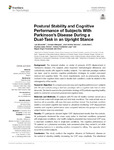Postural Stability and Cognitive Performance of Subjects With Parkinson's Disease During a Dual-Task in an Upright Stance

Use este enlace para citar
http://hdl.handle.net/2183/26738Colecciones
- GI-ESAFEX - Artigos [38]
Metadatos
Mostrar el registro completo del ítemTítulo
Postural Stability and Cognitive Performance of Subjects With Parkinson's Disease During a Dual-Task in an Upright StanceAutor(es)
Fecha
2020-07-29Cita bibliográfica
Morenilla L, Márquez G, Sánchez JA, Bello O, López-Alonso V, Fernández-Lago H and Fernández-del-Olmo MÁ (2020) Postural Stability and Cognitive Performance of Subjects With Parkinson’s Disease During a Dual-Task in an Upright Stance. Front. Psychol. 11:1256. doi: 10.3389/fpsyg.2020.01256
Resumen
[Abstract] Background: The reviewed studies on center of pressure (COP) displacement in Parkinson’s disease (PD) subjects show important methodological differences and contradictory results with regard to healthy subjects. The dual-task paradigm method has been used to examine cognitive prioritization strategies to control concurrent postural and cognitive tasks. The motor requirements, such as pronouncing words, involved in the cognitive tasks used in double-task conditions could be related to the heterogeneity of the results.
Research Objective: To compare postural sway and cognitive performance in subjects with PD and controls using a dual-task paradigm with a cognitive task free of motor demands. We tried to examine the prioritization strategy of PD patients regarding healthy adults to control for concurrent postural and cognitive tasks.
Materials and Methods: 25 subjects with PD and 20 healthy controls carried out a postural task under both single-task and dual-task conditions. The postural task was to stand as still as possible, with eyes first open and then closed. The dual-task condition added a concurrent cognitive task based on phoneme monitoring. COP displacement variables and cognitive performance were compared between the groups and within-subject factors were also examined.
Results: PD participants showed higher COP displacement results than the controls. All participants shortened the mean sway radius in dual-task conditions compared with single-task conditions; only healthy subjects presented less transversal COP sway in dual-task conditions than in single-task conditions. The cognitive performance of PD patients on a phoneme monitoring task worsened when they carried it out while maintaining balance in a standing position compared to sitting. The opposite effect occurred in control subjects.
Conclusion: This study confirms the negative influence of Parkinson’s disease on the control of standing stability, increasing the COP sway amplitude. The attentional demands of a postural task, such as standing balance, may be greater in PD patients than in healthy subjects. This would affect the performance of patients during dual-task conditions to be able to control a postural task while performing other cognitive tasks. In these conditions, cognitive performance would be negatively affected. These results suggest that subjects with PD, at least during initial disease stages, prioritize postural control over other concurrent tasks, as is also seen in healthy subjects.
Palabras clave
Dual-task
Parkinson's disease
Upright stance
Postural sway
Balance
Parkinson's disease
Upright stance
Postural sway
Balance
Versión del editor
Derechos
Atribución 4.0 Internacional
ISSN
1664-1078






